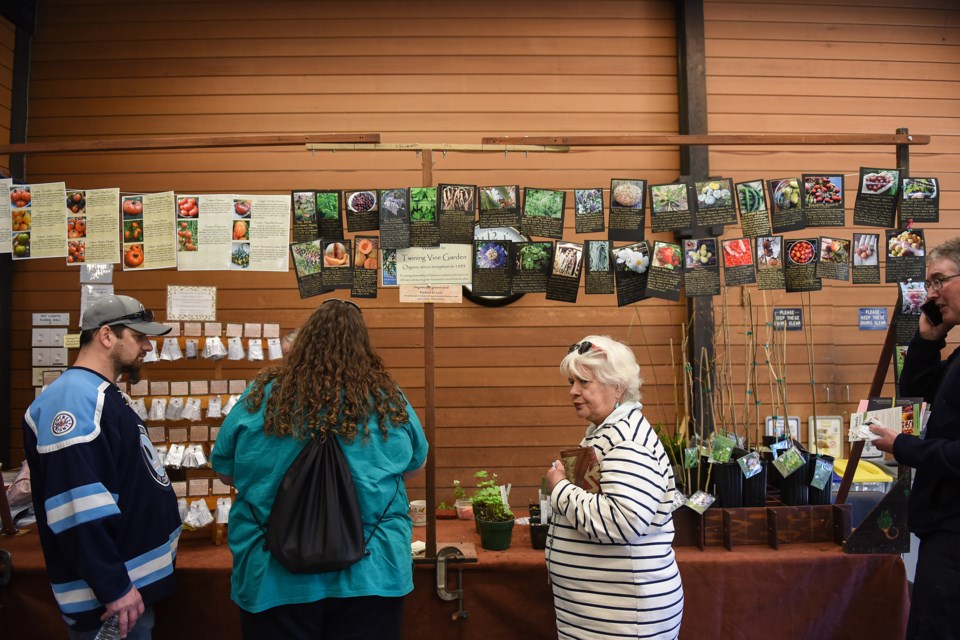If you want to get even closer to your food than buying from the neighbourhood farmers market, then take a look under a magnifying glass. That’s where it all begins.
Seed enthusiasts, master gardeners, farmers and casual planters were at the Floral Hall at VanDusen Botanical Garden to sell and trade heritage and heirloom seeds this past weekend for Seedy Saturday.
Here, master gardener and author Sharon Hanna asked, “Is kale still king?” in the day’s first lecture while Vancouver’s “Mushroom Man” Scott Henderson wrapped up the day’s talks with a presentation about the fungi’s myths and lore.
Rows of tables sold package upon package of seeds, including those from Tatiana and Stan Kouchnarev of Tatiana’s TOMATObase where more than 1,300 different tomato varieties are found in the catalog. The roots of Judy Kenzie’s previous career in advertising are apparent in her labels with their cool black-and-white drawings of a skeleton wearing a cowboy hat on her “Zombie Apocalypse Survival Seeds” tins.
Kenzie runs Strathcona 1890 Urban Seed Collections and is quite well known in these parts, largely because of the garden growing in the bed of her ‘93 pickup truck.
Seedy Saturday (and Seedy Sunday in some places) is held across the country as well as in Europe. In 2012, more than 100 different Canadian communities were involved, much to the delight of Vancouver organizers. The idea for Seedy Saturday started in this city in 1990 by Sharon Rempel, an agronomist who was having difficulty sourcing heritage vegetables and flowers for the 1880s-style garden she was growing at the Keremeos Grist Mill museum.
Lynne Chrismas, president of the Master Gardeners Association of B.C., is also in charge of Vancouver’s Seedy Saturday these days after taking over from the VanDusen Seed Collectors in 2007. She claimed she didn’t have to do too much at the helm when the event changed hands because the Collectors, as gardeners are wont to do, meticulously kept records in a binder that instructed on such topics as how to set up the day to all the vendors’ contact information.
While years have passed, the aim remains the same: a day devoted to seeds, with admission by donation.
“It’s basically to allow people to share seeds, buy seeds, learn how to grow their seeds, and keep the diversity going,” said Chrismas. “It’s also a way for low-income families to come and buy seeds in order to feed their families. Two or three bucks can buy a lot of seeds for lettuce.”
Reminders that Seedy Saturday was, and still is, a grassroots movement was evident by the non-GMO signs on the wall as well as the vendor’s pleas to preserve local varieties. “Our grandparents treasured the wonderful taste so much, and we need to pass these on to our grandkids,” read the sign at Tatiana’s TOMATObase table.
Sometimes seeds came with a history lesson. At the Twining Vine Garden booth, the “Mortgage Lifter” tomato seed was for sale. The heirloom tomato was grown by Marshall C. Byles, a West Virginian whose radiator repair business suffered during the Great Depression. He cross-bred the largest tomatoes he could find, advertising it as being able to feed an entire family. It was wildly popular and Byles was able to pay off his mortgage on his home in four years.
While the interest and support of farmers markets indicates a trend to get closer connected to the food system, saving and planting heritage and heirloom seeds is hardly considered by governments and large seed companies, added Chrismas.
“Now it’s even more important to keep the diversity going in our food system.”
USC Canada was also part of Seedy Saturday and the non-profit development group’s mandate of promoting agricultural diversity and sustainable living, with a focus on rural communities, is in keeping with the event’s goals.
Perhaps the Kenzie’s label on her zombie attack seed kit relayed the sustainability message best: “Because in a post-apocalyptic world there are only so many brains to go around.”
rvblissett@gmail.com
twitter.com/rebeccablissett



